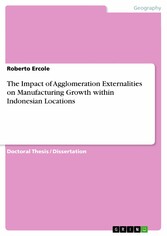The Impact of Agglomeration Externalities on Manufacturing Growth within Indonesian Locations
von: Roberto Ercole
GRIN Verlag , 2018
ISBN: 9783668663442
, 221 Seiten
Format: PDF
Kopierschutz: frei
Preis: 24,99 EUR
eBook anfordern 
Mehr zum Inhalt

The Impact of Agglomeration Externalities on Manufacturing Growth within Indonesian Locations
Doctoral Thesis / Dissertation from the year 2017 in the subject Geography / Earth Science - Regional Geography, grade: Ph.D., , language: English, abstract: Differences in agglomeration externalities and industrial regimes between locations generate performance differentials for their localized economic activities. For more than two decades, scholars have debated which externality is dominant for growth and under which regime. The present study aims to resolve this debate by analysing the influence of agglomeration economies on the growth of five-digit manufacturing sectors and firms in Indonesia between 2000 and 2009 discriminating cities and regencies. Specialization, competition, population density, human capital, and a set of varieties are employed. This is conducted shedding the light on policy implications of economic variety sectoral decomposition functional to revitalize Indonesian manufacturing growth after the Asian Financial Crisis, which substantially hits the Indonesian economy and manufacturing. Empirical evidence reveals that Indonesian policymakers should develop initiatives to support the competitiveness of key labour-intensive industries and manufacturing transformation towards knowledge-based productions. This can be achieved through promoting key specialised clusters characterized by large sectoral interconnectivity favouring inter and intra-industry knowledge spillovers, which allow underpinning the competitiveness of clusters and overcoming the two typical drawbacks of highly specialized locations (lock-in and lack of resilience). The formation of human capital, and the development of technologically advanced industries come to light as crucial drivers to construct a more conductive innovative environment and reduce manufacturing exposure to external industry-specific shocks. Population density and industrial diversity antithetically influence manufacturing growth in cities and regencies due to their economic heterogeneities.









